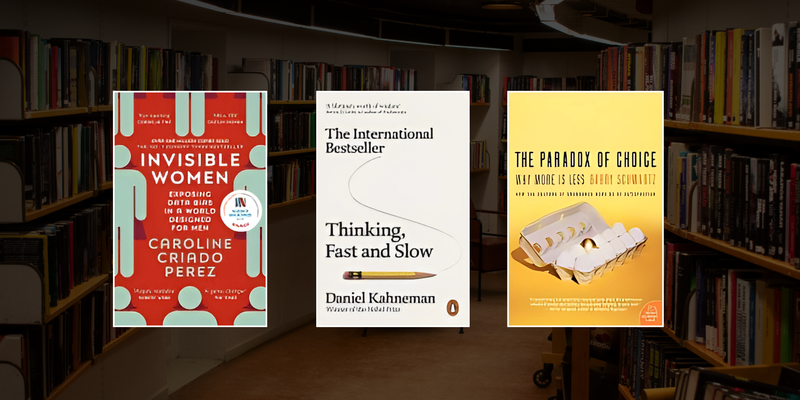
Have you ever noticed how people tend to sit at the edges in empty rooms? Why the same fashion trends reappear every decade? Or how small decisions made in seconds can shape entire lives?
Life is full of patterns—predictable, often invisible structures that guide our actions, thoughts, and outcomes. Yet, most of us live without consciously noticing them. Fortunately, some authors have spent their careers uncovering these recurring themes in behaviour, society, and economics.
This list highlights 10 game-changing books that dig beneath the surface of daily life and expose the logic, psychology, and data that govern how the world truly works. Whether you’re trying to understand human behaviour, consumer habits, or social trends, these books will reshape how you see the world.
10 books that explain what shapes your choices
1. Freakonomics by Steven D. Levitt and Stephen J. Dubner
What do sumo wrestlers and schoolteachers have in common? How is a real estate agent like the Ku Klux Klan? This bestselling book takes seemingly unrelated scenarios and reveals the economic forces and incentive structures beneath them.
Levitt and Dubner argue that people may lie, cheat, or act strangely when incentives are misaligned—and once you learn to “think like a freak,” you can start spotting these patterns everywhere. The book uses engaging storytelling to help readers understand why people do what they do, even when it doesn’t make sense on the surface.
2. The Tipping Point by Malcolm Gladwell
Gladwell introduces the idea that small, well-timed interventions can spark large social movements. From fashion trends to crime waves, The Tipping Point shows how a few key people (Connectors, Mavens, and Salesmen), combined with a sticky idea and the right environment, can cause explosive change.
The book reveals why some ideas catch fire while others fizzle, offering a pattern for understanding social epidemics. You’ll walk away seeing how marketing campaigns, cultural shifts, or even viral tweets gain traction.
3. Predictably Irrational by Dan Ariely
Dan Ariely’s fascinating experiments demonstrate that our irrationality follows a pattern. From pricing to procrastination, Predictably Irrational explores how humans consistently make decisions that defy logic—but do so in remarkably predictable ways.
People will often pay more for something just because they were shown a higher number first (anchoring bias). This book helps you recognise the mental traps we all fall into and gives practical advice on how to avoid them.
4. The Power of Habit by Charles Duhigg
Why do we brush our teeth in the morning without thinking? How do corporations like Starbucks and Target use habits to drive business? Duhigg reveals the science of habit formation, showing that all habits follow a loop: cue → routine → reward.
Whether you’re trying to build healthier habits, boost productivity, or break bad routines, this book gives a blueprint for rewiring your behaviour by understanding the underlying psychological patterns that drive them.
5. Thinking, Fast and Slow by Daniel Kahneman
Nobel Prize-winning psychologist Daniel Kahneman explains how two systems govern our thinking: System 1 is fast, instinctive, and emotional; System 2 is slow, logical, and deliberate.
This cognitive framework explains why we jump to conclusions, misjudge probabilities, and fall for illusions. It’s an essential guide for anyone looking to make smarter, more rational decisions in a world of complexity.
6. Nudge by Richard Thaler and Cass Sunstein
Why do default options matter so much? Whether it’s auto-enrolling employees in retirement plans or rearranging a cafeteria to promote healthy eating, Nudge shows how small changes in how choices are presented can steer people toward better decisions—without restricting freedom.
This book is widely influential in public policy and behavioural economics, offering insights that can be used in business, education, and health interventions. It teaches the power of gentle guidance over force.
7. Invisible Women by Caroline Criado Perez
From phone sizes to urban planning to crash test dummies, the world is largely designed for men—because data often excludes women. Invisible Women lays bare how a persistent gender data gap affects everything from safety to healthcare.
Perez’s meticulous research reveals that what seems “normal” often excludes half the population. It’s a powerful reminder that the patterns we assume to be neutral often reflect deep systemic biases.
8. Everything Is Obvious (Once You Know the Answer) by Duncan J. Watts
We love simple explanations for complex outcomes. But Watts, a network theorist and sociologist, argues that common sense is often misleading. The book explores why it’s hard to predict success, why trends are hard to reverse-engineer, and how hindsight bias distorts our understanding of the past.
You’ll learn to question simplistic explanations and develop a more robust framework for understanding cause and effect in complex systems, like economies, media, and human behaviour.
9. The Paradox of Choice by Barry Schwartz
Having more choices should empower us, but Schwartz argues that it often leads to stress, anxiety, and regret. Through research and real-life examples, he reveals how too many options can paralyse us and make us less satisfied with our decisions.
This book is a wake-up call in an age of information overload, showing that simplicity and constraints often lead to better outcomes and greater happiness.
10. Dataclysm by Christian Rudder
Using data from millions of online interactions, especially from OKCupid and Twitter, Rudder explores what people do when they think no one is watching. Unlike traditional surveys, this book dives into behaviour at scale, revealing truths about race, gender, desire, and politics.
Dataclysm is both a cultural analysis and a reflection on the new power and responsibility that comes with access to massive behavioural datasets.
Conclusion
These books aren’t just intellectually stimulating—they’re tools for transformation. By learning to spot the hidden patterns that govern our habits, decisions, and systems, we become more conscious participants in our lives and the world around us.
They challenge you to re-examine what you think you know. The next time you make a purchase, watch a trend unfold or question your own choices, you might just spot the invisible forces at play.

